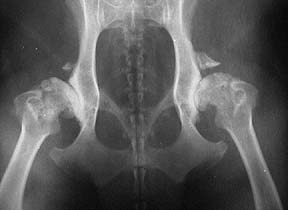Information about Degenerative Joint Disease for Your Pet
Description:
Degenerative Joint Disease describes a progressive condition where the smooth cartilage, which normally protects the joint surface, is worn away. Since there are no nerves in cartilage, there is no pain, in normal healthy joints, when the cartilage rubs against cartilage. In pets with DJD, the worn down cartilage exposes bone, which does contain nerves, and the result is pain and inflammation when the boney surfaces rub.The body responds to the inflammation by depositing calcium and small spiny projections of bone (osteophytes) develop. This makes the pain worse.
Causes:
- DJD can occur in dogs of all ages where there is excessive wear and tear on the particular joint.
- Obesity can contribute to DJD because the extra weight causes more wear on the joint surfaces.
- Most cases of DJD are the result of conformation problems in the joint. Fractures in or near a joint can heal with irregular joint surfaces or angulations, which cause more wear and tear.
- Ruptured ligaments left untreated can also lead to DJD.
- Genetically transmitted conformation problems such as elbow or hip dysplasia result in excessive wear and resultant DJD.
Symptoms:
Symptoms may vary depending on the age of the pet, location of the affected joint(s), severity of the DJD, and the disposition and pain threshold of the dog.
Some commonly described signs are:
- Abnormal gait
- Muscle atrophy
- Difficulty getting up after lying down
- Difficulty jumping into car
- Difficulty going down stairs
- Licking at joints
- Seeking warm places to sleep
Diagnosis:
Diagnosis involves obtaining an accurate history of the symptoms, physical exam and manipulation of the joints, and confirmation with Radiographs.
Treatment:
- Some DJD can be treated with surgery. Total hip replacement is a surgical remedy for DJD secondary to hip dysplasia.
- Most pets can live comfortably with the help of NSAID’s (non steroidal anti-inflammatory drugs). These drugs are safe and effective for most pets provided they have no drug sensitivities or underlying liver or kidney problems. Blood tests are performed on pets who require long term use of NSAID’s.
- Nutraceutical remedies are also helpful. These are non-prescription “organic type” compounds that contain supplements for joint cartilage maintenance and joint fluid production. These products are said to slow down the degeneration of the joint.
- Fish oil supplements have anti-inflammatory properties and can be of benefit.
- Holistic (Acupuncture) therapy may be an option for pet owners so inclined.
- Weight reduction for overweight pets is recommended.
Other Information:
Degenerative Joint Disease (DJD) is progressive. It gets worse over time. Our objective is to delay the progression and keep the pet as comfortable and pain free as possible.


